Contents
Fungal diseases affect fruit trees, garden flowers, berry and vegetable crops. An effective method of dealing with lesions is the use of the chemical drug Abiga Peak. The fungicide acts against a wide range of diseases, and, subject to the rules of use, is safe for the environment.
Features of the fungicide
Abiga Peak is a contact agent that is used to combat fungal diseases. The main component of the drug is copper oxychloride. Its content in the fungicide is 400 g/l.
When the active substance interacts with the fungus, copper is released. As a result, the cells of the fungus are destroyed, and sporulation stops. The working solution covers shoots and leaves, does not allow spores to penetrate into plant tissues.
The active substance does not penetrate into the fruits and tubers of plants. The use of the drug does not affect the taste and commercial qualities of the fruit.
Fungicide Abiga Peak belongs to the 3rd hazard class. Subject to the rules of use, the product does not harm people, animals and the environment.
The drug is effective in the fight against certain diseases:
- late blight;
- cercosporosis;
- Alternaria;
- spotting;
- bacteriosis;
- monilioz;
- scab;
- mildew;
- oidium and others
The drug is available in sealed bottles with a capacity of 1,25 and 50 g. For the treatment of extensive plantings, it is better to purchase a container that can hold 12,5 kg of the drug.
The shelf life of the unopened fungicide is 3 years from the date specified by the manufacturer. The working solution is not stored after preparation, so it is important to accurately calculate the dosage.
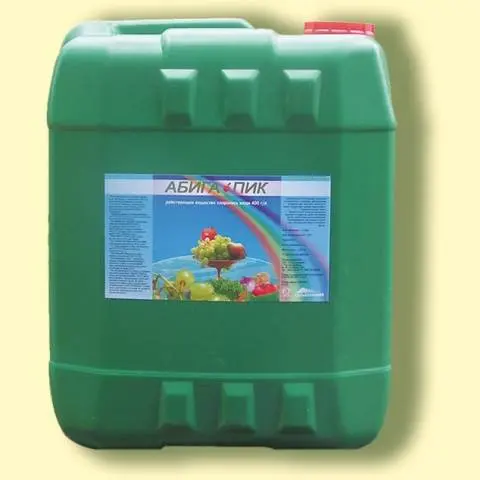
Advantages
The use of Abiga Peak has certain advantages:
- ease of preparation of the solution;
- promotes an increase in chlorophyll in plant cells;
- effective at low air temperatures;
- the solution adheres well to the leaves and provides protection against the fungus;
- long storage period;
- compatibility with other fungicides;
- lack of phytotoxicity for plants;
- low degree of danger to insects, birds and animals;
- does not reduce soil fertility.
Disadvantages
When choosing a fungicide Abiga Peak, the following disadvantages are taken into account:
- the need to strictly observe the dosage and precautions;
- not always available for sale;
- poses a danger to fish;
- limited period of validity (10-20 days).
The order of application
To obtain a working solution, you need to mix the required amount of Abiga Peak with water. Then the resulting solution is poured into the spray bottle.
When working with products containing copper, use only glass, enamel or plastic utensils. Plantings are sprayed with a solution using a fine sprayer.
Vegetables
Fungal diseases affect potatoes, tomatoes, cucumbers, onions and root crops. Most often, horticultural crops suffer from late blight, alternaria, bacteriosis.
The defeat covers the aerial part of plants, slows down their development and reduces productivity. If measures are not taken in a timely manner, then the landings will die.
To obtain a solution according to the instructions for use, take 50 ml of Abiga Peak suspension, which is dissolved in 10 liters of water. Plantings are sprayed when symptoms of diseases appear.
During the season, 3-4 treatments are carried out. Preventive spraying with the drug is performed before flowering. Processing stops 21 days before harvest.
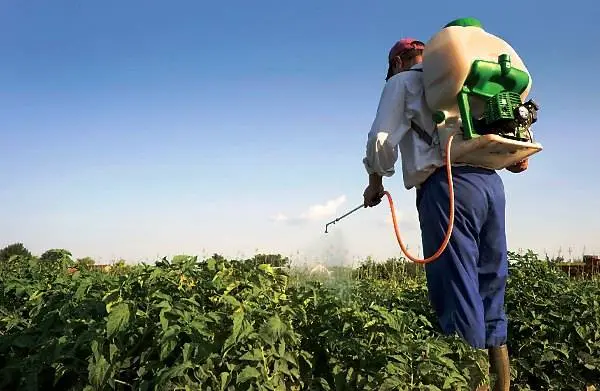
Fruit trees
Apple and pear trees suffer from scab. This is a fungal disease that appears on the leaves as light green spots. Gradually, they grow and become brown in color. The defeat covers the flower stalks and leads to a decrease in yield.
Another dangerous disease of fruit trees is fruit rot. The disease covers the fruits, on which traces of decay appear. As a result, crop yields drop significantly.
The fungicide helps to cope with other diseases of plum, cherry, apple, apricot and pear:
- clusterosporiosis;
- coccomycosis;
- curly.
For the prevention and treatment of diseases of fruit trees, a solution is prepared consisting of 25 ml of a fungicide and 5 liters of water. According to the instructions for Abiga Peak, trees are sprayed with a solution no more than 4 times per season.
Grapes
The vineyard is prone to a wide range of diseases: oidium, mildew, anthracnose, black spot. Diseases are fungal in nature and spread with high humidity, an abundance of precipitation, the use of low-quality seedlings, and lack of care.
When alarming symptoms appear, a solution containing 40 ml of fungicide per 10 liters of water is prepared. Processing is carried out by spraying the bushes.
During the season, up to 6 grape treatments are carried out. Copper chloride is not used 3 weeks before the removal of clusters. According to the instructions for use of the drug Abiga Peak, the minimum interval between procedures is 14 days.
For preventive purposes, the grapes are sprayed in early spring when buds open, before the appearance of inflorescences and in autumn after harvesting.
Strawberries
In cold and damp weather, spots of white or brown color appear on strawberry leaves. Gradually, they grow, lead to a decrease in yield, slow down the development of bushes. These are signs of white and brown spotting.
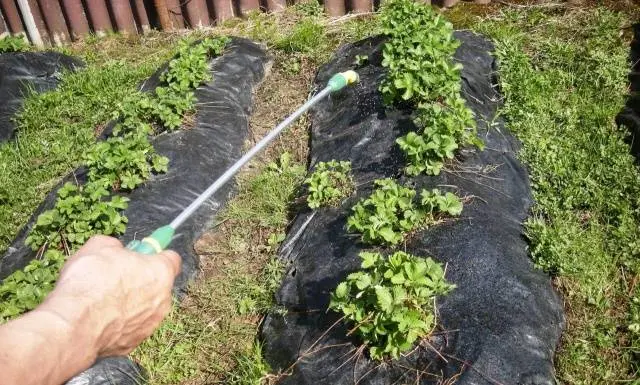
To combat strawberry diseases, prepare a solution containing 50 ml of suspension in a large bucket of water. Plantings are sprayed over the leaf so that the solution completely covers the leaf plate.
For prophylactic treatment with Abiga Peak, according to the instructions, choose the period before flowering and after harvesting the berries. When strawberries ripen, it is better to refuse treatments.
Deciduous and coniferous trees
Plantations of deciduous and coniferous trees need preventive treatments against rust. The disease affects leaves, needles and cones, which lose color and crumble.
To protect plantings from rust, mix 50 ml of copper oxychloride and 10 liters of water. Trees are sprayed with the resulting solution. To prevent the spread of rust, treatment with the drug is carried out in early spring.
Flowers
Rust and spotting occur on annual and perennial flowers: clematis, chrysanthemums, carnations. Roses are especially susceptible to such diseases. With the spread of the fungus, the decorative qualities of flowers are lost, and the plants themselves develop slowly.
For spraying the flower garden, a solution of Abiga Peak fungicide is prepared according to the instructions for use, containing 40 ml of suspension per 10 liters of water. Plants are sprayed twice a season.
Before starting work, the affected parts of the plants are removed. After treatment with the drug, indoor flowers are not brought into the house during the day. The door to the balcony is kept closed.
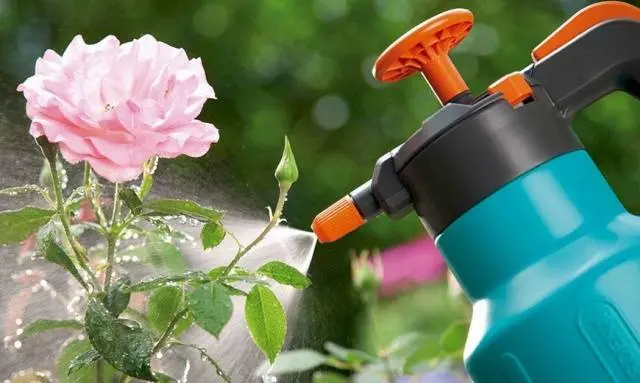
Safety measures
Copper chloride is used in accordance with the instructions. To protect the respiratory organs and mucous membranes, special means are used: a respirator or mask, long-sleeved clothing, gloves.
If the solution gets on the skin, remove the liquid with a cotton swab. Wash the contact area with soap and water. If the solution gets into the eyes, open them wide and rinse with water for 20 minutes.
In case of poisoning with the drug, you need to drink a glass of water and 2 tablets of activated charcoal. It is imperative to see a doctor. Copper compounds are quickly absorbed by the stomach, so in this case you can not do without medical help.
Fungicide treatment is carried out on a cloudy windless day or in the evening. During spraying, people without protective equipment and animals should not be within a radius of 150 m.
Reviews of gardeners
Conclusion
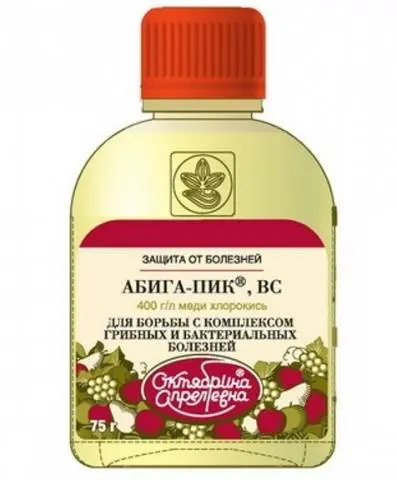
Fungicide Abiga Peak is a reliable tool for protecting plantings from the spread of fungus. The composition of the drug includes a copper compound that destroys fungal cells. For processing plants, a working solution is required. When interacting with copper oxychloride, observe safety precautions, do not allow direct contact with the solution. The tool is used for the prevention and control of existing diseases.










kur galima nusipirkti aprašytą fungicidą